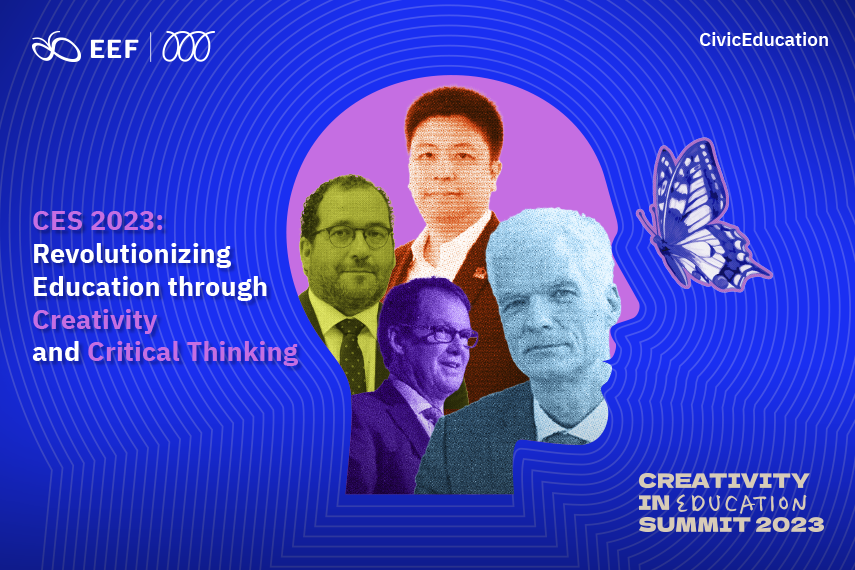
In a collaborative effort between the Global Institute of Creative Thinking (GIoCT) and the OECD Centre for Educational Research and Innovation (CERI), the Creative in Education Summit 2023 (CES 2023) has once again emerged as a pivotal force in reshaping the landscape of education. This year’s summit, held on November 23-24, focused on leadership in creative thinking, spotlighting the OECD’s groundbreaking Professional Learning on Creative Thinking (PLCT) program.
Diverse stakeholders came together at the summit, creating a vibrant tapestry of perspectives and expertise. Leaders and policymakers from national and regional education ministries, education experts and scholars affiliated with the OECD and its member countries, and education practitioners, including teachers, school leaders, and administrators, were all active participants in the dynamic discussion.
Importance of creative and critical thinking in education
João Costa, Portugal’s Minister of Education and Professor of Linguistics at the Universidade Nova in Lisbon was the first to deliver a presentation. He started by highlighting a particularly fascinating point that when society engages in discussions about the potential for creativity in education, we often find ourselves succumbing to what he termed ‘false dichotomies.’
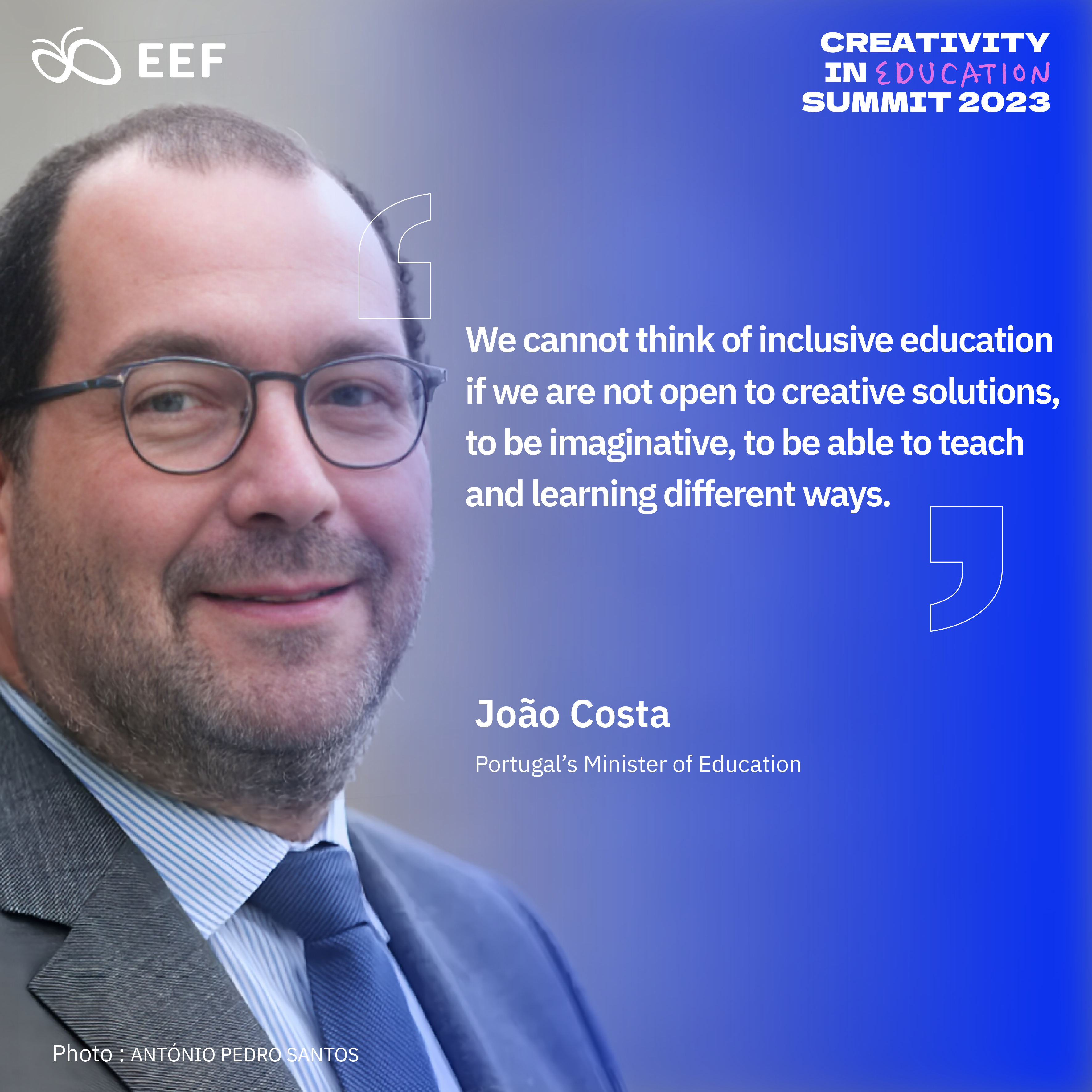
João Costa (ภาพ: ANTÓNIO PEDRO SANTOS)
For instance, there’s a tendency to assume that designing a curriculum to prioritize student happiness may compromise its seriousness. Alternatively, the belief arises that pursuing inclusivity in schools may come at the expense of excellence. These assumptions create a false narrative of having to choose one over the other, when, in reality, that is not always the case. João insisted that a curriculum can simultaneously prioritize both students’ happiness and seriousness, just as a school can be both inclusive and excellent concurrently.
By discussing the role of creativity and critical thinking in education, we are, at the same time, trying to undo some of these false dichotomies. Leading the summit with the opening address, he presented 11 crucial reasons and concrete proofs as to why we need to promote creativity and critical thinking in education. While doing so he shed light on pressing topics such as the significance of creative and critical thinking in the rapid integration of AI into our societies, policy challenges related to changing daily practices for teachers and students, and Portugal’s initiatives in fostering creativity in schools and universities.
The first reason addresses the clash between the traditional perception of an ideal student and the desired outcome of education. João argued against the stereotype of a quiet, passive, and highly competitive individual, advocating instead for an active and innovative student who doesn’t merely repeat information. Portugal has actively worked on tools fostering creativity and problem-solving skills, integral to their upcoming national curriculum.
Reflecting on historical figures such as Galileo, Socrates, and Plato, João pointed out the inherent curiosity and innovation of old scientists and philosophers. He warned against an education system focused on routine work and memorization, emphasizing the need to develop experimental sciences in classrooms to nurture the spirit of inquiry and problem-solving.

Socrates (left) and Plato (right) in The School of Athens (painted by Raphael)
The ‘Avalanche of Information’ versus an ‘Avalanche of Knowledge’ was the third focus, addressing the prevalence of misinformation and fake news in the digital age. João stressed the necessity of cultivating skills that enable students to discern between accuracy and falsehood.
Memory retention emerged as the fourth crucial point, expressing concern over the tendency to forget learned information. Active engagement through discussions, debates, and real-world application was highlighted as a key strategy to ensure that knowledge is etched into long-term memory.
The fifth reason linked diversity and imagination, emphasizing the role of inclusion in fostering creativity. João cited historical examples where creative thinkers advocated for societal change, highlighting the importance of encouraging students and teachers to question traditional approaches and ensure inclusivity in the learning process.
“We cannot think of inclusive education if we are not open to creative solutions, to be imaginative, to be able to teach and learn in different ways.”
Addressing the impact of AI, the sixth reason stressed the difficulty in asking meaningful questions, revealing the need to foster curiosity in schools. João underscored the importance of curiosity for students to pose relevant questions, preventing a lack of interest in answers.
The seventh reason advocated for valuing the educational process over outcomes, emphasizing the importance of guiding students in active thinking and problem-solving. João argued that understanding the connections and causal relations between necessary steps is vital in meeting the demands of society.

(Photograph: Christina Morillo/Pexels)
The eighth reason called for a shift in questioning children about their future careers, emphasizing the need to foster adaptability to the ever-changing labor market. The ninth reason drew from Antonio Damasio’s work, highlighting the importance of emotions in decision-making, and urging attention to students’ social and emotional skills.
The tenth reason is intricately connected democracy and creativity, emphasizing the time-consuming nature of debates and discussions in comprehending diverse perspectives. Despite knowledge-centric education, João lamented the neglect of equipping students with the ability to question established knowledge.
The final reason celebrated the unique human capacity for language and appreciation of arts, literature, and music. João underscored the need for pauses in education to nurture creativity and critical thinking, emphasizing the profound impact of human expressions.
In essence, João Costa’s address advocates for a holistic and transformative approach to education, recognizing creativity and critical thinking as fundamental pillars in preparing students for the challenges of the modern world.
The power of creativity
The summit then transitioned to a panel featuring three individuals representing various stakeholders from outside the education sector, providing diverse perspectives from industry, research, and policy. Kraiyos Patrawart from Thailand, the Managing Director of the ‘Equitable Education Fund (EEF), was among the panelists.
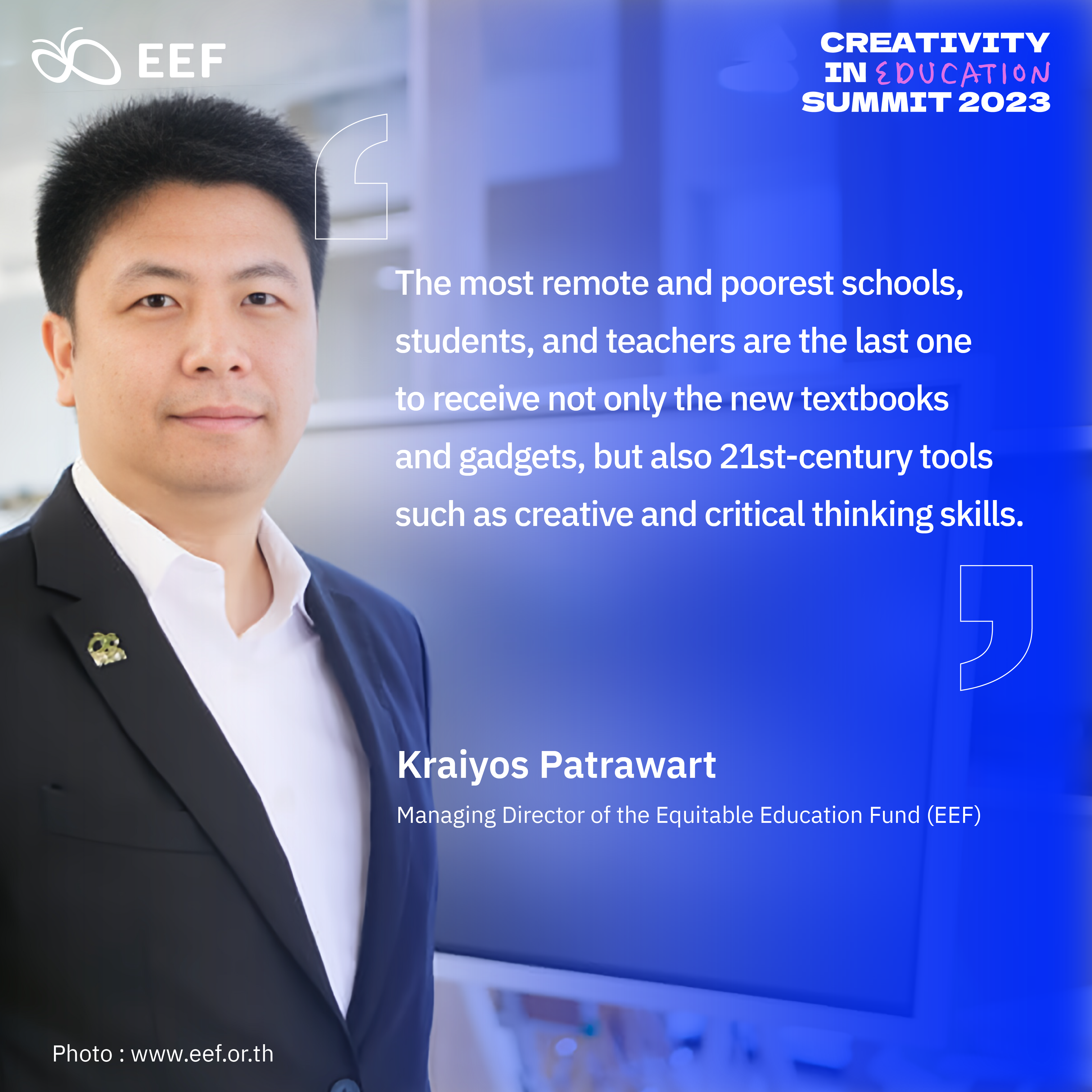
Kraiyos Patrawart (Photograph: www.eef.or.th)
Each year, EEF disburses conditional cash transfers to more than 1.3 million compulsory school-age students from underprivileged households throughout Thailand. To curb dropout rates, EEF offers scholarships to thousands of students pursuing higher education and vocational degrees. Additionally, the organization is actively engaged in pioneering research and technology initiatives to devise solutions for equitable education.
To articulate the organization’s vision, Kraiyos provided a detailed explanation of the pivotal roles that creativity and imagination play in expanding opportunities for young people. He provided an example of students under EEF support, emphasizing that the outdated 20th-century style of education, involving sitting still and memorizing facts, falls short for these children aiming to break free from intergenerational poverty. In his view, creativity is one of the most crucial skills for the most vulnerable children.
“The most remote and poorest schools, students, and teachers are the last ones to receive not only the new textbooks and gadgets but also 21st-century tools such as creative and critical thinking skills,” Kraiyos remarked.

(Photograph: Mario Heller / Unsplash)
Hence, to empower these children with the necessary tools to navigate the future job landscape from their own villages, EEF goes beyond cash transfers, offering them a skill set that encompasses creativity and critical thinking.
With experience in collaborating with over a thousand schools, ten thousand teachers, and hundreds of thousands of students throughout Thailand, EEF has endeavored to create an impactful teacher training program and curriculum. Among the effective methods discovered, project-based learning stands out. This approach links creativity with addressing inequality, allowing students, for instance, to sell a product and interact with the marketplace, fostering entrepreneurial skills.
One of the primary challenges, as highlighted by Kraiyos, is building trust with schools and teachers. Introducing OECD work to teachers initially raised concerns as it seemed like a completely new and potentially difficult initiative for them to implement. Teachers in Thailand often grapple with extensive paperwork, taking on roles beyond teaching, and sometimes teaching becomes a lower priority.
This dynamic needs to change, but it’s a complex process. To instill confidence in embracing change, EEF had to assure the schools and teachers that they would have continuous support and encourage them to be courageous in adopting new approaches.
Creating education system for the future
As a Director for Education and Skills, and Special Advisor on Education Policy to the Secretary-General at the OECD in Paris, Andreas Schleicher supports the organization’s strategy to produce analysis and policy advice that advances economic growth and social progress. During the summit, he presented examples and data on how education systems in OECD countries are embedding creative and critical thinking in teaching and learning and what more could be done.
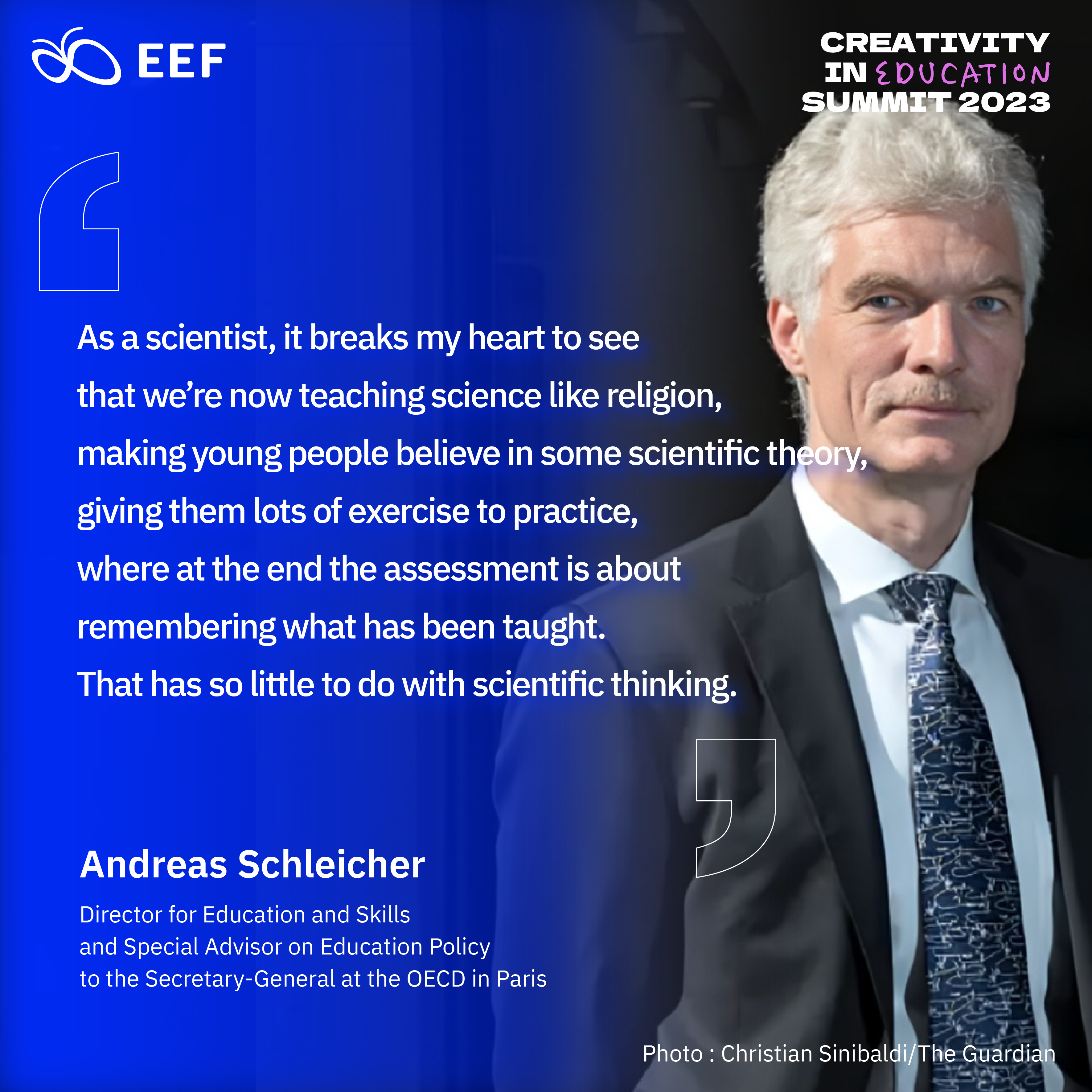
Andreas Schleicher (Photograph: Christian Sinibaldi/The Guardian)
Andreas began by highlighting a notable yet unsurprising outcome from the survey: the average reported social and emotional skills of 15-year-old students, regardless of gender and social background, were lower than those of their 10-year-old counterparts. While developmental factors may contribute to this trend, it could also stem from the expectation of compliance within education systems, potentially leading to the diminishing of curiosity and creativity as students progress through the system.

(Photograph: Yan Krukau/Pexels)
“As a scientist, it breaks my heart to see that we’re now teaching science like religion, making young people believe in some scientific theory, giving them lots of exercise to practice, where at the end the assessment is about remembering what has been taught. That has so little to do with scientific thinking, which is all about inquiries and questioning the established reason of our time,” expressed Andreas.
In alignment with João’s earlier assertions in the opening address, Andreas mentioned the challenges of navigating information in today’s world. The overload of information has transformed the way we acquire knowledge. In the past, we merely had to extract information from texts, but now we are required to carefully construct knowledge ourselves. For that, we will need digital navigating skills.
Analyses of the concept of a student’s growth mindset, as presented by Andreas, also suggest that a significant number of students in certain Asian countries such as Indonesia, believe that intelligence is something they cannot change. Conversely, students in Estonia, a country that performed exceptionally well on PISA, believe they can achieve success through diligent study. This demonstrates a link between a growth mindset and academic success as well as the students’ well-being.
To cultivate these mindsets and skills, creativity is crucial. However, we might initially need to reconsider how we perceive each school subject concerning creativity. Many people associate creativity predominantly with arts, overlooking the potential for subjects like mathematics and science to be taught creatively.
While the approach may be more intricate, Andreas concluded that assessment of creativity and critical thinking projects can and should be incorporated into every school subject.
The leadership of creativity in schools, policy, research, and practices
The second day of the summit, November 24, commenced with a presentation by Bill Lucas, Director of the Centre for Real-World Learning (CRL) at the University of Winchester and Chair of the advisory board of GIoCT. He explored the progress made across the globe and delved deep into some key lessons essential for school leaders.
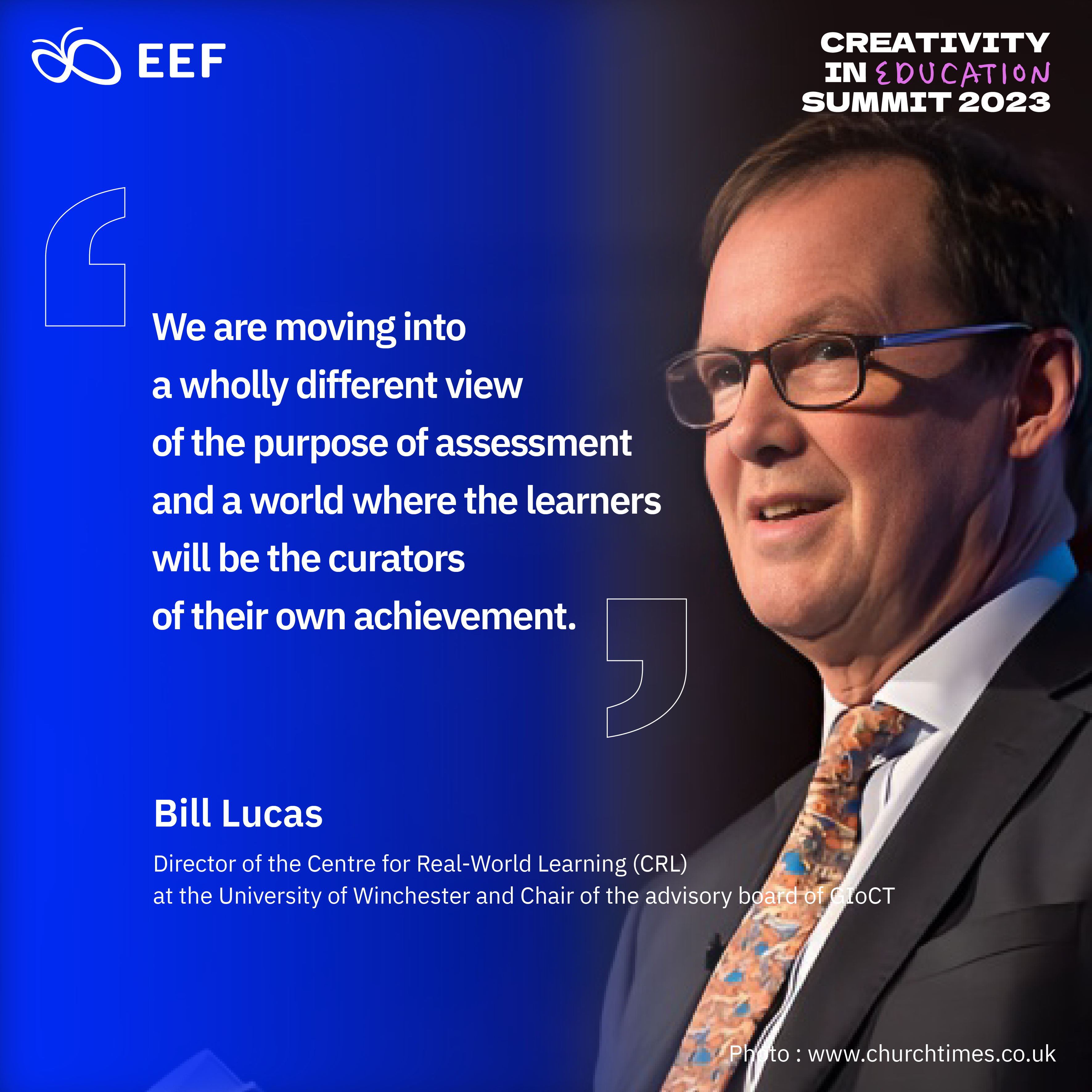
Bill Lucas (Photograph: https://www.churchtimes.co.uk/articles/2019/15-february/features/interviews/bill-lucas-education-adviser-winchester-cathedral)
Bill’s presentation revolves around a model of creativity specifically designed for schools called the ‘12 Dimensions of Creative Thinking in Schools.’ This encompasses different aspects of the process such as curriculum focus, people development, culture, assessment, and leadership. Several presentations and panel discussions during the summit have already delved into some of these dimensions.
One aspect that Bill expected to garner more attention in the near future and play a substantial role in reshaping education is, quite surprisingly, ‘assessment.’
“We are moving into a wholly different view of the purpose of assessment and a world where the learners will be the curators of their achievement,” Bill commented.
The CES 2023 not only offered a glimpse into the cutting edge of creativity and innovation in education but also served as a nexus for collaboration and knowledge exchange. As we reflect on this transformative event, it is evident that the seeds planted at the summit will germinate into a future where education is not just a process, but a dynamic journey shaped by the forces of creativity and innovation.

